 Preisverleihung (Bild: Johannes Puch)
Preisverleihung (Bild: Johannes Puch)
Bachmann Sunday in Klagenfurt
Traditionally, “inscrutable things” happen on the “tricky” Bachmann Sunday, the day the prizes are awarded – this year, however, everything was very quick and the winners were chosen. And again, the audience and the jury were in surprising agreement.
At the top of the “shortlist”: Wawerzinek
You could physically feel the tension that was spreading this Sunday at Klagenfurt’s ORF Theatre when the jury began to select the winners of 2010 with the help of the electronic voting process. The shortlist containing the names of the seven authors that the jury shortlisted for the Bachmann Prize had just been presented. It had been kept a secret until the last minute.
The name of the future Bachmann Prize winner 2010, “Peter Wawerzinek” was right at the top of the list, almost like an omen. This was followed by the “second winner” of the day, 24-year-old Dorothee Elmiger, whose text “Einladung an die Waghalsigen” had been very well received by the jury on the first day of the readings. Nobody at the time expected her to be a future Klagenfurt winner: on this Bachmann Sunday, Elmiger took home the Kelag Prize worth 10,000 euros.
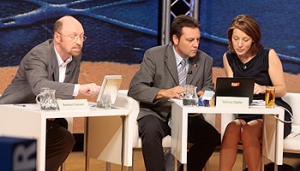 Jury (Bild: Johannes Puch)
Jury (Bild: Johannes Puch)
No Austrian was shortlisted
The list also included: Aleks Scholz, Judith Zander, Daniel Mezger, Sabrina Janesch and Christian Fries – a selection that left a bitter aftertaste – at least with juror Karin Fleischanderl and the Austrian literature fans: because since none of Fleischanderl’s authors were shortlisted, this meant that no Austrian author was a Bachmann Prize candidate.
The voting this year was very quick
Unlike in previous years, the Bachmann Prize voting was very quick this year – partly because not every juror gave his vote to his own author only to have to change it later. There was still a runoff, of course, namely between Peter Wawerzinek (proposed by Meike Feßmann), who received three votes the first time round, and Dorothee Elmiger (invited by Paul Jandl).
Feßmann was the first to give her reasons, and of course her vote went to “her author”, Peter Wawerzinek.
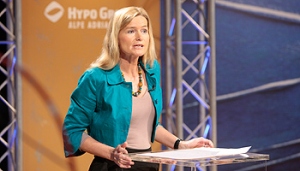 Meike Feßmann (Bild: Johannes Puch)
Meike Feßmann (Bild: Johannes Puch)
Feßmann: “Author reveals life wound”
“I vote for a text that reveals the life wound of an author and that uses the imagination to change it into something that the reader can participate in. A prose that is a great gift and not just asserts the great significance of language for our existence but specifically demonstrates it. My vote goes to the ‘Rabenliebe’ of an abandoned child, for Peter Wawerzinek.”
Alain Claude Sulzer also voted for Wawerzinek even though his author, Sabrina Janesch, was also on the shortlist, because Wawerzinek’s “voice from the past talks with many tongues”.
Karin Fleischanderl voted for Dorothee Elmiger and stuck with it the second time round, jury chairman Burkhard Spinnen did not vote for his author, Daniel Mezger, either and instead went for Wawerzinek “for the impressive reconstruction of a stolen childhood”.
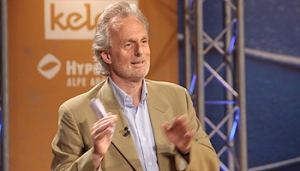 Hubert Winkels (Bild: Johannes Puch)
Hubert Winkels (Bild: Johannes Puch)
“Ernst Willner Prize” for Aleks Scholz
New juror Winkels stayed true to “his author” Aleks Scholz, “because he attempts to tell a story using a cold and distant scientific language and perspective without immediately arriving at the heart and psychology of the characters”. Scholz came away empty-handed, at least as far as the Bachmann Prize and Kelag Prize are concerned, but he later was awarded the “Ernst Willner Prize”.
Winkels: “An old acquaintance of Klagenfurt”
In the honorific speech to the Willner Prize, Winkel explained to the audience how Scholz, who is an “old acquaintance of Klagenfurt”, was selected: “He is part of this central intelligence agency, which had already caused a stir before, but he also operates the “riesenmaschine.de” blog, which also assesses Klagenfurt texts – according to external aspects such as the frequency of certain adjectives. The work of Aleks Scholz follows the same principle.”
“Google Earth”, or of “grids and pixels”
The text “Google Earth” does not talk about the “hero’s inner life”, rather, using a “spatial super-perspective” it “zooms into” the reality of what is being said. A “text that operates in accordance with natural historical principles”, said Winkels. What is being told is not the story of the characters themselves, rather it is the “grids and pixels” that bring out the story. The author uses this to direct attention to the “principles of form” themselves.
“If flawless is not a swearword then I would use it – I am happy about the Ernst Willner Prize for Aleks Scholz.” The prize was presented by ORF regional director Willy Haslitzer, who remarked: “I thought that you would win something here.”
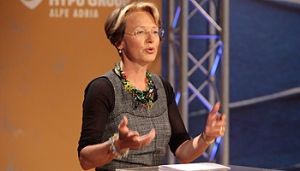 Hildegard E. Keller (Bild: Johannes Puch)
Hildegard E. Keller (Bild: Johannes Puch)
3sat Prize for Judith Zander
“My vote goes to the impressive description of a small part of the East German world”, was Hildegard Elisabeth Keller’s reason for her Bachmann Prize vote for her author Judith Zander, who the jury later chose for the 3sat Prize.
In the honorific speech, Keller made a link between the winning text by Wawerzinek and Zander’s text “Dinge, die wir heute sagten”, when she said, looking back at the speech by Sibylle Lewitscharoff: “For me this is a stimulating gesture by Miss Fortuna, that she awards the Bachmann Prize to a childhood and the fate of a special mother in East Germany and the 3sat Prize to a text that deals with the beginning pregnancy of such as mother – you can draw a link between the two works.”
“Girl without qualities”
Keller continues: “Ingrid drinks dragon’s blood, it hardens her soul, and drives out all passion from her. She tells her story reluctantly, consistently in the second person, touches herself, so to speak, with clammy fingers. You find out how she came to be what she is: country wench, teenager, mother, girl without qualities.”
Hubert Novak of 3sat finally presented Zander with the prize and said: “I hope that you will never lose your imagination or your words.”
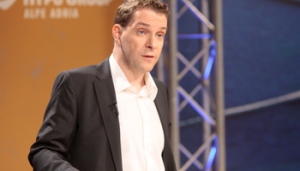 Paul Jandl (Bild: Johannes Puch)
Paul Jandl (Bild: Johannes Puch)
“Kelag Prize” for young author Elmiger
From the outset, Paul Jandl stayed with “his author” Dorothee Elmiger and this was his reason: “I vote for a text that leads to a terra incognita of the lived-in world, clever, poetic and full of knowledge.”
Elmiger, who was defeated 4:3 by Wawerzinek in the runoff, managed to win the votes for the Kelag Prize against Aleks Scholz in the end. In his honorific speech for Elmiger Jandl “was initially very happy that new literature stirs in this way”.
Literary “new territory under one’s feet”
Because, according to Jandl: “When the needle of Klagenfurt’s compass trembles, the direction is not always right. The magnetic fields of the Bachmann Prize are so unpredictable that one should be happy to feel some new territory under one’s feet. Dorothee Elmiger’s text ‘Einladung an die Waghalsigen’ is clever and full of knowledge and only the hard of hearing will not realise how poetic it all is.”
“All the daredevils remain invited”
Her text is “the linguistically precise attempt” “to measure the reality of a devastated territory again; from books and pictures, stories and circumstantial evidence the world is being retold at a vertex of history”. A “virtuoso proof: good literature is a risky business, ultimately with a happy ending – all daredevils remain invited”.
Harald Kogler presented the prize to Dorothee Elmiger and used this opportunity to invite the author to the “Kelag erlesen” series of readings at the Musil House.
Feßmann: “I was nervous until the end”
Peter Wawerzinek’s patron Meike Feßmann, who had been “nervous until the end”, was deeply moved about the fact that with Peter Wawerzinek a text that “convinced her entirely” was awarded the Bachmann Prize.
“It is great literature, not flawless and not perfect” but rather wrested from the author’s “own life in a painful process”. Wawerzinek’s language is “unsentimental but not without pathos”, his text “Ich finde dich” [I find you] searches for what it means to be abandoned by your own mother at the age of two without “exposing” it.
“The child has a strong companion by its side: the writer Peter Wawerzinek – he gives the child something very significant on its way, his imagination.”
“Literature as a life-saving measure”
Woven into language, the child is in a protective cocoon, says Feßmann: “Literature as a life-saving measure can be felt in every line in this piece of prose. It allows the reader to participate in the adventure of imagination.” Finally, the juror called upon the readers to buy Wawerzinek’s book, which will by published by Galliani at the end of 2010: “Read it, I can warmly recommend this great book, which I have already read.”
Mayor Christian Scheider and deputy mayor Albert Gunzer presented Wawerzinek with the Bachmann Prize worth 25,000 euros.
Audience prize: 170 votes for Wawerzinek
The audience prize worth 7,000 euros also went to Peter Wawerzinek , who received 170 votes – which means that at the end of the competition, jury and audience found a common ground and were in perfect agreement – at least as far as literary taste was concerned. The second audience prize winner was Aleks Scholz (77 votes), and third was Christian Fries with 71 votes.
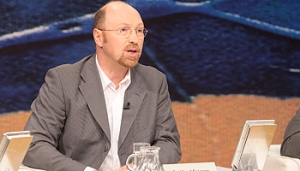 Burkhard Spinnen (Bild: Johannes Puch)
Burkhard Spinnen (Bild: Johannes Puch)
At the end, jury chairman Burkhard Spinnen said the traditional closing remarks, this year about literature becoming loud.
Burkhard Spinnen’s closing remarks
Barbara Johanna Frank
Peter Wawerzinek is awarded Bachmann Prize
Wawerzinek works through his childhood
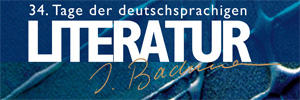 TDDl 2010
TDDl 2010